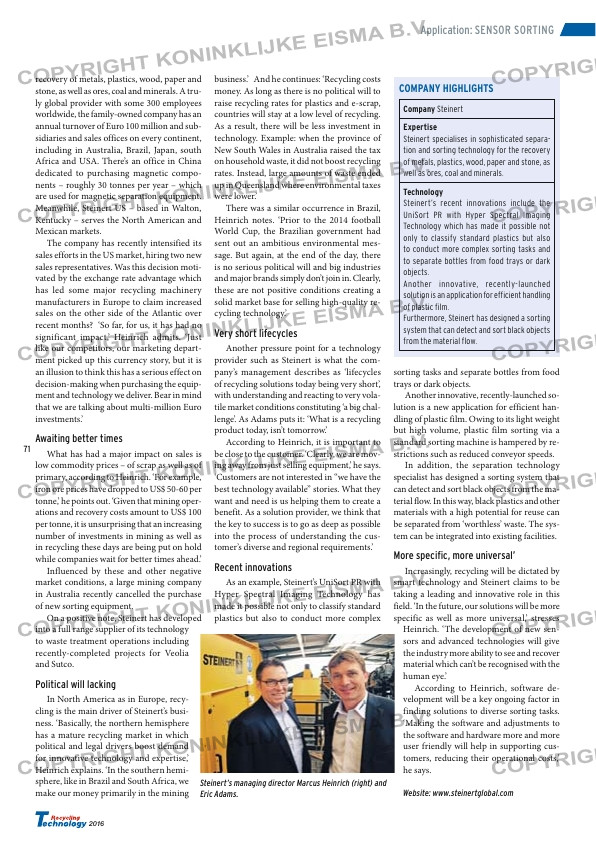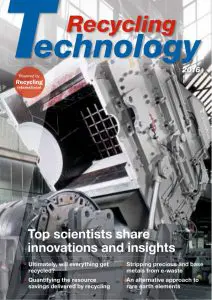Page 71 from: Recycling Technology 2016

71
2016
Application: SENSOR SORTING
recovery of metals, plastics, wood, paper and
stone, as well as ores, coal and minerals. A tru-
ly global provider with some 300 employees
worldwide, the family-owned company has an
annual turnover of Euro 100 million and sub-
sidiaries and sales offices on every continent,
including in Australia, Brazil, Japan, south
Africa and USA. There’s an office in China
dedicated to purchasing magnetic compo-
nents – roughly 30 tonnes per year – which
are used for magnetic separation equipment.
Meanwhile, Steinert US – based in Walton,
Kentucky – serves the North American and
Mexican markets.
The company has recently intensified its
sales efforts in the US market, hiring two new
sales representatives. Was this decision moti-
vated by the exchange rate advantage which
has led some major recycling machinery
manufacturers in Europe to claim increased
sales on the other side of the Atlantic over
recent months? ‘So far, for us, it has had no
significant impact,’ Heinrich admits. ‘Just
like our competitors, our marketing depart-
ment picked up this currency story, but it is
an illusion to think this has a serious effect on
decision-making when purchasing the equip-
ment and technology we deliver. Bear in mind
that we are talking about multi-million Euro
investments.’
Awaiting better times
What has had a major impact on sales is
low commodity prices – of scrap as well as of
primary, according to Heinrich. ‘For example,
iron ore prices have dropped to US$ 50-60 per
tonne,’ he points out. ‘Given that mining oper-
ations and recovery costs amount to US$ 100
per tonne, it is unsurprising that an increasing
number of investments in mining as well as
in recycling these days are being put on hold
while companies wait for better times ahead.’
Influenced by these and other negative
market conditions, a large mining company
in Australia recently cancelled the purchase
of new sorting equipment.
On a positive note, Steinert has developed
into a full range supplier of its technology
to waste treatment operations including
recently-completed projects for Veolia
and Sutco.
Political will lacking
In North America as in Europe, recy-
cling is the main driver of Steinert’s busi-
ness. ‘Basically, the northern hemisphere
has a mature recycling market in which
political and legal drivers boost demand
for innovative technology and expertise,’
Heinrich explains. ‘In the southern hemi-
sphere, like in Brazil and South Africa, we
make our money primarily in the mining
business.’ And he continues: ‘Recycling costs
money. As long as there is no political will to
raise recycling rates for plastics and e-scrap,
countries will stay at a low level of recycling.
As a result, there will be less investment in
technology. Example: when the province of
New South Wales in Australia raised the tax
on household waste, it did not boost recycling
rates. Instead, large amounts of waste ended
up in Queensland where environmental taxes
were lower.’
There was a similar occurrence in Brazil,
Heinrich notes. ‘Prior to the 2014 football
World Cup, the Brazilian government had
sent out an ambitious environmental mes-
sage. But again, at the end of the day, there
is no serious political will and big industries
and major brands simply don’t join in. Clearly,
these are not positive conditions creating a
solid market base for selling high-quality re-
cycling technology.’
Very short lifecycles
Another pressure point for a technology
provider such as Steinert is what the com-
pany’s management describes as ‘lifecycles
of recycling solutions today being very short’,
with understanding and reacting to very vola-
tile market conditions constituting ‘a big chal-
lenge’. As Adams puts it: ‘What is a recycling
product today, isn’t tomorrow.’
According to Heinrich, it is important to
be close to the customer. ‘Clearly, we are mov-
ing away from just selling equipment,’ he says.
‘Customers are not interested in “we have the
best technology available” stories. What they
want and need is us helping them to create a
benefit. As a solution provider, we think that
the key to success is to go as deep as possible
into the process of understanding the cus-
tomer’s diverse and regional requirements.’
Recent innovations
As an example, Steinert’s UniSort PR with
Hyper Spectral Imaging Technology has
made it possible not only to classify standard
plastics but also to conduct more complex
sorting tasks and separate bottles from food
trays or dark objects.
Another innovative, recently-launched so-
lution is a new application for efficient han-
dling of plastic film. Owing to its light weight
but high volume, plastic film sorting via a
standard sorting machine is hampered by re-
strictions such as reduced conveyor speeds.
In addition, the separation technology
specialist has designed a sorting system that
can detect and sort black objects from the ma-
terial flow. In this way, black plastics and other
materials with a high potential for reuse can
be separated from ‘worthless’ waste. The sys-
tem can be integrated into existing facilities.
More specific, more universal’
Increasingly, recycling will be dictated by
smart technology and Steinert claims to be
taking a leading and innovative role in this
field. ‘In the future, our solutions will be more
specific as well as more universal,’ stresses
Heinrich. ‘The development of new sen-
sors and advanced technologies will give
the industry more ability to see and recover
material which can’t be recognised with the
human eye.’
According to Heinrich, software de-
velopment will be a key ongoing factor in
finding solutions to diverse sorting tasks.
‘Making the software and adjustments to
the software and hardware more and more
user friendly will help in supporting cus-
tomers, reducing their operational costs,’
he says.
Website: www.steinertglobal.com
COMPANY HIGHLIGHTS
Company Steinert
Expertise
Steinert specialises in sophisticated separa-
tion and sorting technology for the recovery
of metals, plastics, wood, paper and stone, as
well as ores, coal and minerals.
Technology
Steinert’s recent innovations include the
UniSort PR with Hyper Spectral Imaging
Technology which has made it possible not
only to classify standard plastics but also
to conduct more complex sorting tasks and
to separate bottles from food trays or dark
objects.
Another innovative, recently-launched
solution is an application for efficient handling
of plastic film.
Furthermore, Steinert has designed a sorting
system that can detect and sort black objects
from the material flow.
Steinert’s managing director Marcus Heinrich (right) and
Eric Adams.



